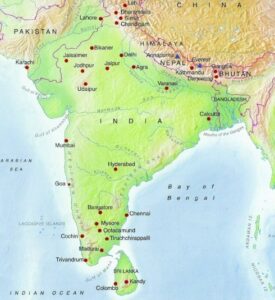How do the Deccan Traps provide information about Earth’s past and what geological processes resulted in their formation?
The Deccan Traps were formed through extensive volcanic activity that occurred around 66 million years ago during the late Cretaceous period. This geological phenomenon was driven by a mantle plume, which caused massive outpourings of basaltic lava over a relatively short geological timespan. The reRead more
The Deccan Traps were formed through extensive volcanic activity that occurred around 66 million years ago during the late Cretaceous period. This geological phenomenon was driven by a mantle plume, which caused massive outpourings of basaltic lava over a relatively short geological timespan. The resulting lava flows covered large areas, creating one of the largest volcanic features on Earth. These basaltic layers, known as traps due to their step-like formations, provide critical insights into Earth’s history. They offer evidence of volcanic activity’s role in shaping the planet’s surface and contributing to mass extinction events, including the one that led to the demise of the dinosaurs. The Deccan Traps also help scientists understand the processes of plate tectonics, mantle dynamics, and the long-term impact of volcanic activity on climate change, as the released gases could have caused significant atmospheric alterations.
See less

The Deccan Traps are a huge volcanic province in India. They formed from fissure eruptions of basalt lava 66 million years ago. They cover about 500,000 square km and are divided into three units. These formations cover a substantial portion of the Deccan Plateau and have raised questions about theiRead more
The Deccan Traps are a huge volcanic province in India. They formed from fissure eruptions of basalt lava 66 million years ago. They cover about 500,000 square km and are divided into three units. These formations cover a substantial portion of the Deccan Plateau and have raised questions about their origins and implications for our understanding of the planet’s past.
Geological Processes Leading to the Formation of the Deccan Traps
Deccan Traps offers Insights into Earth’s History in the following ways
The Deccan Traps stand as a testament to the Earth’s geological complexity and its ever-evolving history. These volcanic formations offer invaluable insights into mass extinctions, climate change, tectonic movements, and the deep-seated processes that have shaped our planet over millions of years. Studying them continues to be a gateway to unlocking the mysteries of our Earth’s past.
See less